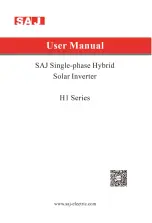
6-1. INTRODUCTION
This section contains an overall functional description of
the 8020 series function generators as well as detailed cir-
cuit analysis of the various sections of the instruments. In-
formation pertaining to the pulse width, the amplitude
modulation and the standard IEEE interface (Option 1) are
also included.
Information is arranged to provide a description of in-
dividual functional circuit blocks. As an aid to under-
standing, the descriptions are keyed to accompanying
block diagrams and simplified schematics. Detailed sche-
matics and component layout drawings are located at the
end of this instruction manual.
6-2. OVERALL FUNCTIONAL DESCRIPTION
The 8020 series is a line of fully programmable function
generators having various standard output functions. All
parameters are adjustable through front panel touch
switches or through IEEE programming. The high per-
formance of the 8020 series is accomplished by utilizing a
very fast, discrete analog circuits. Microprocessor and
digital circuits control the performance of the analog cir-
cuits and permit direct interfacing to the front panel key-
board and display and to the optional IEEE-488 GPIB; op-
tion 1.
A simplified block diagram of the instrument is shown
in Figure 6-1. The heart of the function generator is its
VCO, where two identical currents with opposite polari-
ties are created. These two currents are switched in, on and
off, charging and consequently discharging a capacitor.
This cycle generates a continuous reclining and declining
voltage ramps. The repetition rate depends on the applied
capacitor and the supplied current.
The same ramp is used for driving the triangle and the
squarewave buffers. The triangle waveform is also util-
ized in generating the sinewave output by using a sine
shaper. The three basic waveforms are then amplified or
attenuated through the output amplifier and fed to the
OUTPUT connector. The output amplifier is capable of
driving its waveforms into a 50 load.
External gating or triggering effect the current which
is supplied to the current generator.
The analog signals are controlled by D to A converters.
The D to A converters receive their controlling informa-
tion through serial to parallel converters; directed by the
microprocessor components.
6-3. ANALOG CIRCUITRY
The following paragraphs contain descriptions of the cur-
rent generator the VCO (voltage controlled oscillator) the
sine shaper the trigger circuit the final amplifier and the
attenuators. Complete and detailed schematics are lo-
cated at the end of this manual.
6-3-1. Current Generator
The current generator generates the necessary currents for
the VCO and the trigger circuits. Figure 6-2 is a simplified
diagram of the current generator. The current generator is
composed of the following sections: Reference source,
DAC, Up/Down current sources, and trigger current
source. Each one is discussed in detail below.
REFERENCE SOURCE
- The reference source gener-
ates the voltage for the DAC. The reference comprises a
zener diode CR13, operational amplifier U33 and their as-
sociated components. When used as a voltage controlled
oscillator, an external voltage is applied to the VCO input
terminal through U48 and U49. This voltage is then fed
through U33 to the current generator.
DAC
- The DAC (digital to analog converter) includes
U34 and operational amplifier U28. Shift registers U29
and U30 control the digital information for the data inputs
SECTION 6
THEORY OF OPERATION
Model 8020
Theory Of Operation
Page 6-1
Summary of Contents for 8020
Page 13: ...This page was intentionally left blank Model 8020 Table of Contents Page 8...
Page 23: ...This page was intentionally left blank Installation Model 8020 Page 2 4...
Page 93: ...Thispagewasintentionallyleftblank Parts List Model 8020 Page 8 10...
Page 95: ......
Page 96: ......
Page 97: ......
Page 98: ......
Page 99: ......
Page 100: ......
Page 101: ......
Page 102: ......
Page 103: ......
Page 104: ......
Page 105: ......
Page 106: ......
Page 107: ......
Page 108: ......
Page 109: ......
Page 110: ......
















































